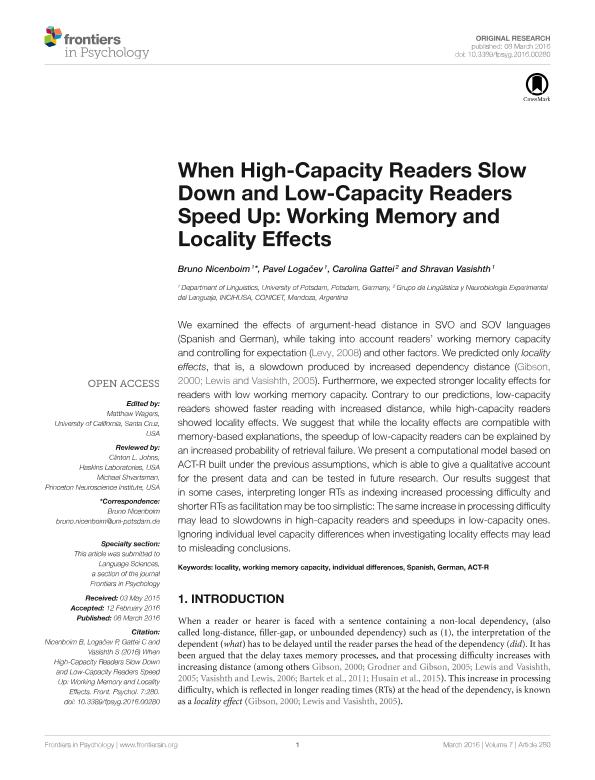Mostrar el registro sencillo del ítem
dc.contributor.author
Nicenboim, Bruno
dc.contributor.author
Logacev, Pavel
dc.contributor.author
Gattei, Carolina Andrea

dc.contributor.author
Vasishth, Shravan
dc.date.available
2018-06-07T17:28:13Z
dc.date.issued
2016-03
dc.identifier.citation
Nicenboim, Bruno; Logacev, Pavel; Gattei, Carolina Andrea; Vasishth, Shravan; When High-Capacity Readers Slow Down and Low-Capacity Readers Speed Up: Working Memory and Locality Effects; Frontiers Research Foundation; Frontiers in Psychology; 7; 280; 3-2016; 1-24
dc.identifier.issn
1664-1078
dc.identifier.uri
http://hdl.handle.net/11336/47687
dc.description.abstract
We examined the effects of argument-head distance in SVO and SOV languages (Spanish and German), while taking into account readers´ working memory capacity and controlling for expectation (Levy, 2008) and other factors. We predicted only locality effects, that is, a slowdown produced by increased dependency distance (Gibson, 2000; Lewis and Vasishth, 2005). Furthermore, we expected stronger locality effects for readers with low working memory capacity. Contrary to our predictions, low-capacity readers showed faster reading with increased distance, while high-capacity readers showed locality effects. We suggest that while the locality effects are compatible with memory-based explanations, the speedup of low-capacity readers can be explained by an increased probability of retrieval failure. We present a computational model based on ACT-R built under the previous assumptions, which is able to give a qualitative account for the present data and can be tested in future research. Our results suggest that in some cases, interpreting longer RTs as indexing increased processing difficulty and shorter RTs as facilitation may be too simplistic: The same increase in processing difficulty may lead to slowdowns in high-capacity readers and speedups in low-capacity ones. Ignoring individual level capacity differences when investigating locality effects may lead to misleading conclusions.
dc.format
application/pdf
dc.language.iso
eng
dc.publisher
Frontiers Research Foundation

dc.rights
info:eu-repo/semantics/openAccess
dc.rights.uri
https://creativecommons.org/licenses/by-nc-sa/2.5/ar/
dc.subject
Working Memory
dc.subject
Language Processing
dc.subject
Spanish
dc.subject
Dependency Resolution
dc.subject.classification
Estudios Generales del Lenguaje

dc.subject.classification
Lengua y Literatura

dc.subject.classification
HUMANIDADES

dc.title
When High-Capacity Readers Slow Down and Low-Capacity Readers Speed Up: Working Memory and Locality Effects
dc.type
info:eu-repo/semantics/article
dc.type
info:ar-repo/semantics/artículo
dc.type
info:eu-repo/semantics/publishedVersion
dc.date.updated
2018-06-01T13:55:50Z
dc.journal.volume
7
dc.journal.number
280
dc.journal.pagination
1-24
dc.journal.pais
Estados Unidos

dc.description.fil
Fil: Nicenboim, Bruno. Universitat Potsdam; Alemania
dc.description.fil
Fil: Logacev, Pavel. Universitat Potsdam; Alemania
dc.description.fil
Fil: Gattei, Carolina Andrea. Consejo Nacional de Investigaciones Científicas y Técnicas. Centro Científico Tecnológico Conicet - Mendoza. Instituto de Ciencias Humanas, Sociales y Ambientales; Argentina
dc.description.fil
Fil: Vasishth, Shravan. Universitat Potsdam; Alemania
dc.journal.title
Frontiers in Psychology
dc.relation.alternativeid
info:eu-repo/semantics/altIdentifier/url/http://journal.frontiersin.org/article/10.3389/fpsyg.2016.00280/full#
dc.relation.alternativeid
info:eu-repo/semantics/altIdentifier/doi/http://dx.doi.org/10.3389/fpsyg.2016.00280
Archivos asociados
